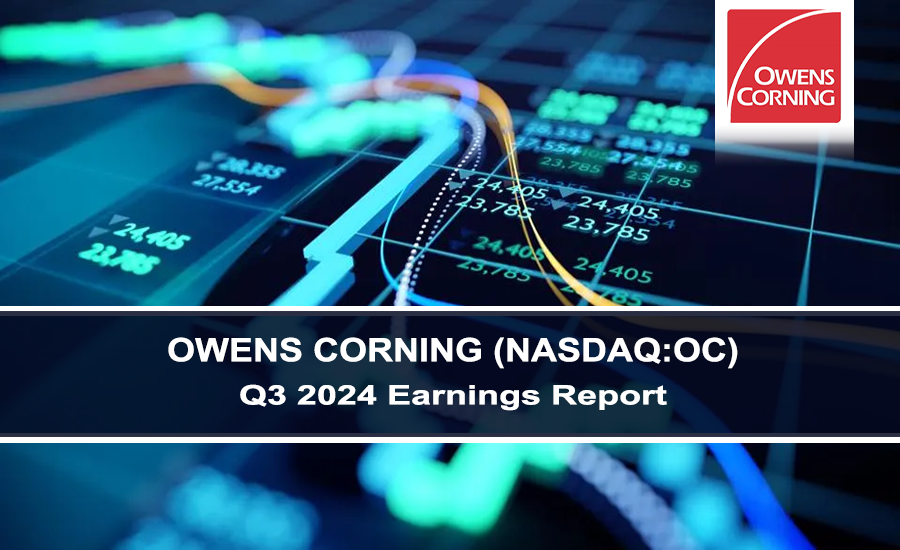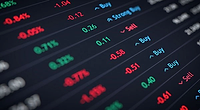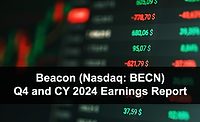Earnings Report
Owens Corning's Q3 Earnings & Sales Beat Estimates, Stock Up

Image courtesy of Wikipedia
Owens Corning (NASDAQ: OC) reported impressive results for the third quarter of 2024, with earnings and net sales each surpassing analysts’ estimates, leading to strong cash flow and higher margins despite challenging market conditions. This marks the seventh consecutive earnings beat for the company.
Owens Corning's shares gained 1.63% since the earnings release on Nov. 8, closing up 3.11 points to $193.55.

"Our third-quarter results demonstrate the impact of the strategic choices and structural improvements we have made to strengthen Owens Corning and build a company that continues to deliver strong free cash flow and sustainably higher margins despite a challenging market environment,” Brian Chambers, OC’s chair and CEO said in a Nov. 8 statement.
“As we finish 2024, we remain focused on sustaining our strong financial performance while executing our strategic agenda to sharpen our product and geographic focus where we can create unique value for our customers and shareholders," Chambers added.
Owens Corning's strategy emphasizes high-margin products, improved operational efficiencies, and divesting capital-intensive businesses in China and Korea. This aims to sustain financial performance and position the company for growth in 2025 as demand stabilizes.
Inside OC’s Q3 Results

The company reported adjusted earnings per share (EPS) of $4.38, which topped the consensus mark of $4.01 by 9.2% and increased 5% from $4.18 a year ago. Net sales of $3.05 billion topped the consensus mark of $3.04 billion by 0.2% and increased 23% year over year from $2.48 billion.
Owens Corning’s Segment Details
Net sales in the Composites segment decreased 6% year over year to $534 million. This was primarily due to tough market conditions and price drops in glass reinforcements.
Earnings before interest and taxes (EBIT) margin contracted to 11% from 14% in the year-ago period. EBITDA margins of 20% also decreased 20 basis points (bps) from a year ago. Lower glass reinforcement prices and additional costs from starting up a new nonwovens line in Fort Smith, Arkansas, were partially offset by improved manufacturing performance.
The Insulation segment achieved net sales of $946 million, a 4% year-over-year increase, driven by positive pricing in the North American residential market despite weaker European demand. The EBIT margin rose by 30 basis points to 19%, and the EBITDA margin increased by 30 basis points to 25% due to strong commercial performance.
Roofing segment net sales held steady at $1.1 billion in the third quarter of 2023, with shingle volumes exceeding the U.S. asphalt shingle market. Higher prices and a favorable product mix compensated for reduced component sales due to inventory adjustments. EBIT and EBITDA margins improved by 10 and 20 basis points, reaching 33% and 35%, respectively.
In its first full quarter as a separate entity, the Doors segment reported net sales of $573 million, facing challenges from reduced discretionary spending on repairs and remodels. EBIT and EBITDA margins were 6% and 16%, respectively.
Operating Highlights of Owens Corning
Adjusted EBIT improved by 12% and adjusted EBITDA by 19% year-over-year. The adjusted EBIT margin of 19% decreased by 20 basis points compared to the prior year, while the adjusted EBITDA margin contracted by 10 basis points to 25%.
OC’s Financials
As of Sept. 30, the company had cash and cash equivalents of $499 million, down from $1.62 billion at the end of 2023. Long-term debt increased to $5.03 billion from $2.62 billion.
In the first nine months of 2024, net cash from operating activities rose to $1.22 billion, up from $1.02 billion last year, while free cash flow increased to $766 million from $631 million.
The return on capital for the twelve months ending Sep. 30, 2024, was 15%, a decrease attributed to the acquisition. The company’s total liquidity stood at approximately $1.8 billion, including $499 million in cash and $1.3 billion in available credit. It also has $400 million in senior notes maturing in the fourth quarter.
Owens Corning Updated 2024 Outlook
The company expects general corporate expenses to be approximately $250 million, slightly reduced from $255 million-$265 million due to ongoing cost controls.
Interest expenses are still estimated to be within $210-$220 million.
Capital additions, depreciation, and amortization are still estimated at approximately $650 million. The company expects an effective tax rate of 24-26% on adjusted earnings.
Looking for a reprint of this article?
From high-res PDFs to custom plaques, order your copy today!







